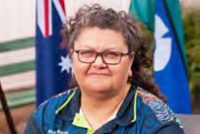
Kirsty Leo
TPCH has recently welcomed Kirsty Leo as Assistant Nursing Director – Aboriginal and Torres Strait Islander Health Service. As the newest member of TPCH’s Executive Leadership Team, Kirsty is responsible for providing high level leadership, guidance and advice to the organisation, working with staff from TPCH Aboriginal and Torres Strait Islander Health Service and senior leaders to re-imagine and co-design how we work together with the Aboriginal and Torres Strait Islander Health community, consumers and families we care for.
As a proud First Nation South Sea Islander woman and with over two decades of work experience in Aboriginal and Torres Strait Islander Health, Kirsty is well equipped to meet the challenges of this newly established role which will largely be involved in leading Queensland’s new Aboriginal and Torres Strait Islander Health Equity reform agenda across TPCH. The agenda’s aim is to drive health equity, eliminate institutional racism across the public health system, and achieve life expectancy parity for First Nations people by 2031.
For Kirsty, one of the keys to achieving this agenda is about building and sharing knowledge.
“Achieving health equity requires working with staff to a build an understanding of the agenda itself,” Kirsty said.
FIVE Health Equity Strategy priority areas:
- Actively eliminate racial discrimination and institutional racism within the Service
- Increasing access to healthcare services
- Influencing the social, cultural and economic determinants of health
- Delivering sustainable, culturally safe and responsive healthcare services
- Working with First Nations peoples, communities and organisations to design, deliver, monitor and review health services.
Kirsty is excited to work with teams across TPCH to build what she calls a ‘brain trust’ – a shared understanding of what health equity for Aboriginal and Torres Strait Islander Health people looks like.
“For health equity to occur, we need to create a co-designed and co-owned health service which considers and understands the needs Aboriginal and Torres Strait Islander people so they feel culturally safe and respected when accessing health services,” Kirsty said.
“This involves working closely with consumers, families and staff to work together as a collective for our TPCH community.”
While Kirsty admits this is a long-term vision, she says that it starts with TPCH staff understanding and embracing the health equity agenda on a day to day basis.
“My role is to work with staff to help them understand where the inequities lie, and that we need to change how we talk, interact and respond to issues around Aboriginal and Torres Strait Islander health,” she said.
Having experienced many of her family members pass away while in their 50s, Kirsty is determined to help change the outcomes and experiences of Aboriginal and Torres Strait Islander peoples.
“As a health system, we need to change the narrative of First Nations people’s health journey, so it is one about understanding the unconscious bias that people have and how that can influence our interactions with our First Nation staff and consumers,” Kirsty said.
“While we continue to change and evolve our knowledges and practices, there is still a long way to go. It’s about understanding that we need to think and act differently in order to achieve health equity for First Nations people and help close the gap.”